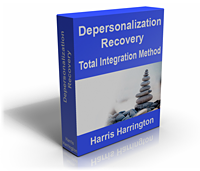Harris Harrington shows you how to overcome anxiety and panic related to Depersonalization.
What is Anxiety?
Anxiety is when we feel fear, worry, or stress over something. Our muscles tense, our heart beats faster, we breathe more heavily. Some times we get anxiety out of the blue and feel uneasy or afraid for no particular reason. Sometimes we become so afraid that we reach a high state of anxiety known as a panic attack. In fact, many people first feel symptoms of DP after a panic attack.
If anxiety is part of DP, then is DP an anxiety disorder?
This gets confusing. DP is a dissociative disorder that is usually accompanied by lots of anxiety. This dissociation is the feeling of disconnection from your self and your surroundings. The anxiety is the fear about these feelings. This anxiety is focused on existential issues, the self, and the strange feelings of DP.
I want you to think of DP as a dissociative disorder that contains within it many symptoms of anxiety. This anxiety is due to two things: trauma from the past and distorted thoughts in the present. As I explained in the trauma article, painful memories that are not consciously processed can pollute our nervous system in the present, causing DP symptoms. We call this form of memory stress “post traumatic stress”. If we don’t address the trauma, then the DP continues.
Likewise, distorted fearful thoughts in the present also contribute to feelings of DP. These fearful thoughts of going insane, of losing your soul, of being afraid of existence are all anxious components of DP. By being afraid of the feeling of dissociation, we make the feeling of disconnection even worse.
In this article I am going to be focusing in on these fearful thoughts or “cognitions”. I am going to be adopting some techniques and principles from Cognitive Behavioral Therapy (CBT) to help you eliminate this anxiety related to DP.
Although I’m not talking about trauma in this article, its important for you to read the trauma article in order to have a more complete view of recovery. Anxiety management is only part of DP recovery.
The Psychosomatic Nature of Depersonalization and Derealization
Anxiety and high stress can cause the manifestation of almost any physical symptoms. In depersonalization, these bizarre physical symptoms are mostly caused by bizarre thoughts (as well as past trauma, explained in the trauma article and video of this series).
So what does this really mean? It means that the physical symptoms are caused by the mind. Don’t look for DP symptoms to go away until you change your MINDSET (and process past trauma).
This means that YOU create the panic that is so common in DPD. If you truly believe that you are fine, you can help eliminate panic, anxiety and much of your DP/DR symptoms. By worrying about going insane, or having a brain disease, or how strange your perceptions are, you make the symptoms of DP worse. By obsessing over strange existential thoughts, you feel more unreal.
The first step to changing your mindset is learning EXACTLY what DP is, what the symptoms are, and what to expect from the condition.
It’s important to understand exactly what DP is, so that you don’t panic. Understanding the nature of the disorder is known as psychoeducation.
Psychoeducation is the beginning of curing most general anxiety and panic
Most anxiety sufferers improve dramatically when they start psychoeducation. They understand all the varied symptoms of anxiety, the muscle twitches and weakness, lightheadedness, thoughts of going insane, difficulty breathing, heart palpitations, feelings of unreality and numbness, etc.
What happens is people read about these anxiety symptoms, and then when they experience them again, they don’t panic.
Claire Weekes, a doctor who wrote about anxiety, said that the real key to overcoming anxiety is eliminating the “second fear”. What did she mean by second fear? And what is first fear?
The first fear is when our anxiety response (also known as the fight or flight response, the stress response) is activated. It can be due to a number of reasons. Worrying (creatively imagining a threat or danger in the future), a stressful event, a lack of sleep, etc. can cause a release of chemicals from your brain, that activates a full body response.
In depersonalization, we often catastrophize about our symptoms. Your body might feel light, so you think “I feel like a ghost”. You then start questioning your reality altogether.
The evolutionary purpose of this release of stress chemicals (cortisol, adrenaline) is to prepare you to fight or flee from a physical danger in your environment.
The classic example is of a caveman fighting a saber tooth tiger, or a warrior of a neighboring tribe.
It goes without saying that this stress response was critical for the survival of our ancestors. Of course, it’s still important for us today, but we face far fewer threats.
When, for example, you worry about going insane, your brain releases the SAME RESPONSE that it would if an ACTUAL tiger was chasing you!
But what happens when you obsess about the strange feelings of DP? You’re probably just sitting in a chair freaking out. Adrenaline and cortisol are being pumped into your blood stream, increasing your heart rate, your breathing, getting your muscles ready for intense exertion, the whole nine yards.
Then what happens? Since you have DP, you also experience more feelings of unreality when you experience more anxiety. You then become afraid of the SYMPTOMS of the fear response! You are afraid of your own fear.
You may think that you are going to suffocate, have a heart attack, or are REALLY going to lose it this time.
But you aren’t.
You aren’t going to lose your soul, turn into a ghost, or any other crazy thing. This type of thought distortion is called emotional reasoning in Cognitive Behavioral therapy (CBT).
Another thing you should understand about the stress response: it lasts for less than 30 minutes. Our bodies are designed to fight or flee from danger NOW in a short amount of time, not over the course of days and weeks.
But the symptoms of derealization and depersonalization remain for those with DPD. The difference between Depersonalization Disorder, and the anxiety related symptom of depersonalization and derealization, is that in those with regular anxiety, the feeling only lasts when they panic.
For those with DPD, anxiety increases their symptoms to a terrible degree.
In addition to the panic, you remain sedentary. The entire purpose of the anxiety response is to get you to take physical action, which is one of the reasons why exercise can dramatically reduce DP and anxiety symptoms.
My view is that, those who have experienced more unresolved trauma are more likely to have anxiety and therefore further dissociate during periods of stress. Depersonalization disorder is really, in my view, a result of complex post traumatic stress.
Consumption of caffeine (if you are caffeine sensitive) and other stimulants can also mimic panic disorder.
How do I overcome these panic attacks?
There are two main lines of defense against panic. The most important thing is to become a more relaxed person through relaxation training, thought correction, and lifestyle changes.
The second line of defense is being able to cope IF you are having a panic attack.
It’s okay to freak out.
If you’re having a fight or flight response, internal resistance will not help you. What you have to do is accept the fact that you are stressed and having an anxiety response. Acceptance just means fully experiencing the panic without trying to change it or wishing it wasn’t there. You can also call this “surrendering to the symptoms”. Sometimes it is described as “floating with the panic”. Panic attacks are like a wave that crashes, returning the sea to a calm state.
Overcome Emotional Reasoning
In Cognitive Behavioral Therapy, emotional reasoning is a type of thought distortion. Emotional reasoning occurs when we justify a thought based on a feeling.
In Depersonalization Disorder we experience many different strange sensations. Just because you feel unreal, doesn’t mean that you actually ARE unreal. Most people know this, but they start freaking out about reality. You may obsess about death, eternity, matter and space.
Just because you feel like an automaton, doesn’t make you one.
You might feel transparent, but you aren’t.
Correcting these frightening, and illogical worries is extremely important. You can write down all of your fears and then challenge them.
The Normalcy Principle
This is an idea I came up with. The idea is that you should view the world as normal.
In DP we often think things aren’t normal. For example, people thought that it was strange when they realized the world was actually a sphere and not flat.
Of course, it’s not “weird” or “strange” at all. It’s totally normal! The same goes for many thoughts in DP.
When you think its “strange” that most matter is empty space, you should correct yourself and realize that it’s actually normal.
In DP, a global sense that existence is strange or weird fuels anxiety. By viewing the world as normal, you will help calm down.
Self Esteem and Acceptance
Acceptance has three forms: acceptance of self, acceptance of life, and acceptance of others. We have a thing called the “sphere of influence”. Imagine this as a circle. Inside of the circle are all of the things that we can control. Outside of the circle are things that we have no control over. Stop worrying and trying to control things that are outside of your control. You are wasting much of your energy and causing unnecessary stress for yourself. Accept what you can’t control, then get busy working towards accomplishing deeply desired goals.
Acceptance is simply fully experiencing things in our lives, without denying, distorting, or dissociating from them.
When you start experiencing DPD symptoms, don’t internally resist them. Remember, you are safe. There is no danger. Simply allow the symptoms to pass, and refocus your attention on something important that needs to get done, or immerse yourself in a relaxing pastime.
It’s okay to feel disturbing emotions. In fact, attempting to suppress emotions is part of emotional perfectionism, the attitude that negative emotions shouldn’t exist at all. This is extremely unhealthy. Journaling about why you feel the way you feel is a good tool for letting out these emotions.
Toxic Perfectionism leads to both stress and depression
When you believe that anything less than perfect is failure, not only do you perceive all of your accomplishments as sub par, but you are less likely to be productive, fearing that anything you make or do will likely be bad.
You then view everything as hopeless. Since you’ve already come to the conclusion that nothing you do is worthwhile, why do anything? Why not just give up?
Steve Jobs said that real artists ship. At some point you have to get the job done, and remember NO ONE is perfect. No song is perfect, no essay is perfect, no performance is perfect.
When you let yourself just be, when you allow yourself to create without an inner critic, and become childlike in your intrinsic enjoyment of what you do, then you become free of your own inner limitations.
Start each day with gratitude
Studies have shown that gratitude is correlated with higher levels of well being.
Imagine being born without legs. Ever day you struggle to get around and do things most people take for granted.
Then one day in your mid twenties you wake and find you have a pair of full functioning legs.
You leap up with joy and skip down the street in exhilaration.
See, gratitude is often experienced after bad things happen, because we truly FEEL what something means to us, and what it means to lose it. But we don’t have to only feel grateful after a close-call. We can feel gratitude every day by listing off all the things we have that are a true blessing.
You determine how you make meaning out of your life
Behind cognitive therapy for anxiety is realizing that you control the meaning you make out of life.
The meaning you make out of situations determines your emotional response. If you feel that things are hopeless, you become depressed. If you think you might die, you feel anxiety and fear.
If you think the world is strange and that your own perceptions are strange, you will feel even more depersonalization.
Much of the time our thoughts are just below, or on the tip of our conscious awareness. Its’ important to identify what we are thinking. A lot of times this happens when we become aware of our emotions.
It can be hard to admit to yourself sometimes what you truly are thinking.
Progressive muscle relaxation
Tension and stress build up unconsciously. In order to release tension and stress from our bodies we have to consciously relax them.
You can either tense your muscles, then relax them, starting with you neck down to your toes, or you can just relax them without tensing them.
Mindfulness Meditation
20 minutes of meditation a day can work wonders for every aspect of depersonalization. Meditation will help you relax, reduce obsessional thinking, and will make you more aware of every aspect of your life, which is key in processing trauma.
By meditating every day, you will dramatically reduce depersonalization and derealization.
Positive Affirmations
Much of the time our internal self talk is negative. One thing you can do is rewrite this negative script to a more positive one. By saying better things to yourself, you are training yourself to become a more positive person. Practicing positivity is extremely important especially if it doesn’t come so naturally to you.
Practice Relaxation on a Daily basis
In order to have an anxiety disorder, you have to practice anxiety. In order to overcome anxiety, you have to practice relaxation. It’s really that simple.
Learn how to do positive visualizations and do them for 20 minutes a day. Practice positive affirmations. Write down five things you are grateful for every day. Practice acceptance of self. Meditate. Be optimistic and focus on concrete way you can improve your life. Identify and challenge distorted thinking. Eliminate perfectionism and negative self talk.
Getting emotional support from family, friends, and lovers
Having emotionally responsive others to help you, and help talk you down from panic attacks is key. Most people with DPD have limited social resources. They may have parents who are self focused and never focused on your needs, so they aren’t going to be that helpful today.
Cultivating healthy friendships is extremely important for reducing anxiety.
Exercise
Physical exercise can dramatically reduce anxiety. The stress response is meant to fuel a physical reaction to threat. When we run for 30 minutes, or lift weights, we are ridding our body of stress chemicals.



